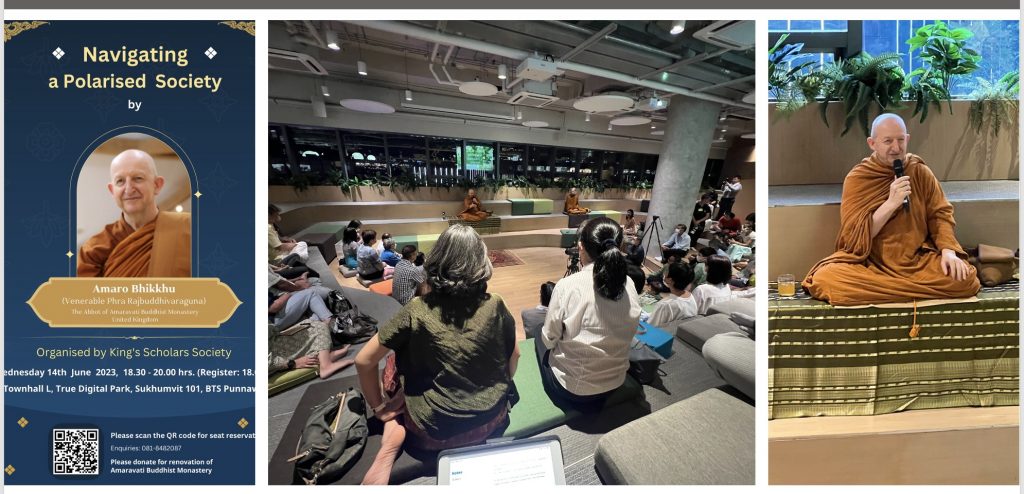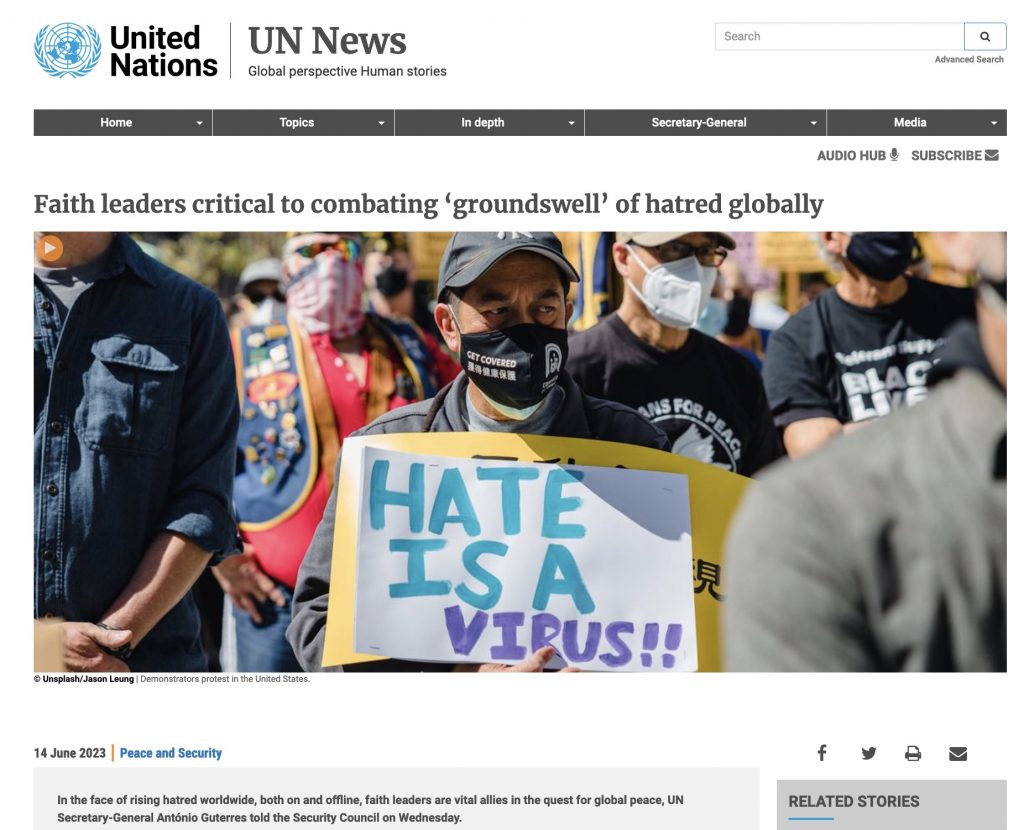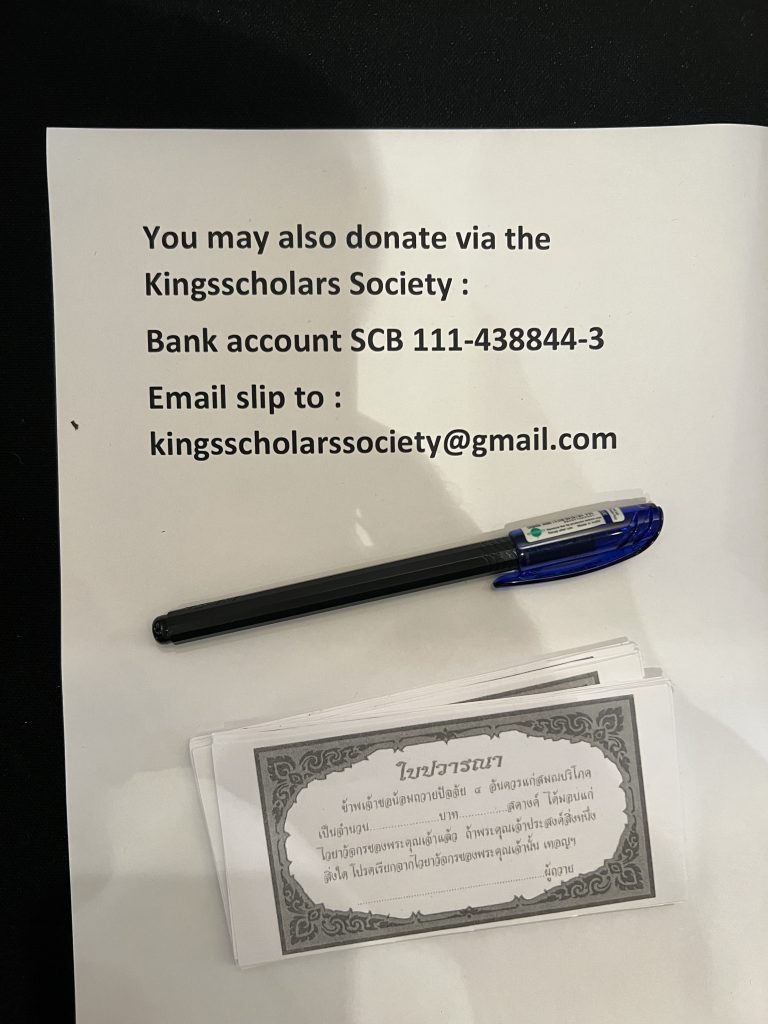
16 Jun, 2023
Buddhist Monk offers East-West hybrid path to navigate polarisation
In a lecture on the topic of “Navigating a Polarised Society” in Bangkok on June 14, the Venerable Amaro Bhikkhu, Abbot of Amaravati Monastery in the UK, cited the North and South Poles as examples of “polarisation” in terms of geographical distance. This same gap now applies, literally, to ideologies, economic and political systems worldwide. As it turned out, the Abbot’s own persona, a hybrid blend of the other two geographical poles, East & West, emerged as a part of the solution.
Born and educated in the West, Ven Amaro Bhikkhu holds a BSc. in Psychology and Physiology from the University of London. His search for spirituality took him eastwards to a Forest Tradition monastery in Thailand. Soon after he headed back west to join the newly established Chithurst Monastery in the UK. He then spent many years between monasteries in the UK and California. (Click here for more detailed bio: https://amaravati.org/biographies/ajahn-amaro/).
This hybrid persona infused his talk, organised by the King’s Scholar’s Society, and gave it much more meaning, value and context.

Ven Amaro Bhikkhu began by quashing expectations that his talk would be in any way partisan. Yes, he had read up the political polarisation in Thailand but as a monastic, he can’t, and won’t, take sides. Neither will he take sides on the polarisation in the West, such as over the Brexit vote in the UK and the polarised political atmosphere in the US. He invoked Buddhist scripture, with Pali and Sanskrit references, and concluded by quoting the powerful “To Be or Not To Be” speech from Shakespeare’s epic Hamlet. In soft, mellifluous tone befitting a Buddhist monk, he also referred to his pre-monkhood days when he did admittedly frequent that popular British rendezvous, the pub.
There was no doubting his clear understanding of life and times in both East and West. True to his birthright, he also made his audience laugh.
By its very definition, he said, polarisation means ‘this against that,’ one group against another, rich vs poor, north vs south, traditionalists vs modernists, urban vs rural, young vs old. Polarisation prevails even within families and the Buddhist monasteries.
It exists. It’s real. The solution, lies in how one deals with it. The best way he can be of help is to simply act as a spiritual resource, a source of wisdom and goodness for everybody. In other words, offer guidance on how people can help themselves.
What is the root cause of polarisation?
While individuals have a right to their views, the trouble starts if they become an attachment, where positions harden into ‘I’m right and you’re wrong.’ Buddhist teachings warn against attachments of all kinds, including perspectives, to the point of clinging, the origin of suffering. In Buddhist teachings, that should be a red flag – a time to take a step back and say, “let’s have another look at the situation.” Even if the protagonists consider themselves to be “right in fact they could be wrong in dhamma,” meaning their attitude. Such polarisation gets further entrenched by the influences of the senses, conventions, personal opinions and pride/ego.
So, how to recognise these patterns of attachments and clinging and how to let go of them? Again, this does not mean disconnecting or disassociating. “Peace is not found by numbing ourselves but by recognising this habit of clinging and then most effectively using the ideas we have productively.” Meditation is not to be used as a means of “switching off,” avoiding family discussions or workplaces. Those are all very much a reality of life. But so is our ability to make choices. In practical terms, it has to be dealt with, using the Buddhist Middle Path as a guide.
Ven Amaro Bhikkhu noted the importance of avoiding people who make a living by promoting polarisation and arguments. He narrated the story of a troublemaker who tried, and failed, to do the same with the Lord Buddha. Another way is to rewind the perspectives, take a deeper look at the origin of the issue and simplify it in relation to the time, place and situation.
He ended by quoting the famous speech from Shakespeare’s Hamlet, “To Be or Not to Be” as an example of how difficult choices have to be made. To those who have studied Hamlet, especially that painful, emotional speech, it was a very, very powerful analogy indeed.
My Key Takeaways for Travel & Tourism, the “Industry of Peace”
1. Ven Amaro Bhikkhu spoke with humour, flair and simplicity. His British background helped, especially their expertise in public speaking. No doubt it had a calming influence on the audience which came away motivated and inspired.
2. Conferences and conventions are always on the lookout for keynote and motivational speakers. Invariably, they seek out futurists, technogurus, marketing/branding professionals and especially these days, sustainability pundits. Their superficial solutions merely replace one set of problems with another. Maybe it’s time to seek out speakers who share wisdom as a more permanent form of sustainability.
3. Like climate change, polarisation is a threat to societies, communities, countries. It is embedded in business mantras to promote competitiveness, which is another form of conflict. Pitting countries and companies against each other may drive economies, but it also leads to an endless rat race.
4. In the political sphere, polarisation may be considered a natural part of a democratic process. However, healthy democratic debate is often stalled by the hardlline “I’m right you’re wrong” attitudes. The Abbot’s warning against those who deliberately create arguments in order to profit from it is also to be taken seriously.
5. In the spiritual world, polarisation is reflected in religious extremism. Moderate, live-and-let-live faith leaders of all ilks can play a positive role in promoting wisdom-based peace and harmony in societies. Also on June 14, the UN Secretary General said the same thing in his opening address at a meeting in the UAE. Read his full comments here…https://news.un.org/en/story/2023/06/1137697

6. Is it time to redefine “resilience”? The pursuit of resilience gets overwhelmed by the barrage of mind-numbing messages from those who profit from conflict. Real resilience will only be achieved by turning that tide.
7. If studied carefully to extract its real value in terms of guidance for management, leadership, conflict-resolution and decision-making, Ven Amaro Bhikkhu’s talk can go a long way towards reducing stress, diverting valuable mind-space towards enhancing productivity and promoting peace and harmony across multiple personal, professional and political disciplines.
The Abbot’s talk plus Q&A session was only 90 minutes, and is best watched in full. A number of questions came up, including one from me. The organisers have told me that the video will be eventually uploaded here: https://www.facebook.com/KingSchlarsSociety?mibextid=LQQJ4d
The guidance is free, but a contribution for the renovation of Amaravati Buddhist Monastery can be made here:




Liked this article? Share it!